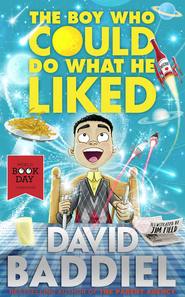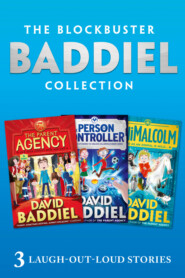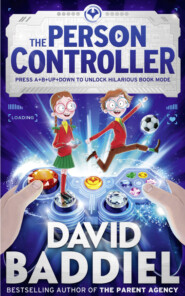По всем вопросам обращайтесь на: info@litportal.ru
(©) 2003-2024.
✖
Head Kid
Настройки чтения
Размер шрифта
Высота строк
Поля
2 Ryan Ward.
(#ulink_346c366f-af25-5664-8b29-6570f29c26eb)
“Right, Six B!” said Mr Barrington, moving the TV monitor into place on top of his desk. “It’s good news. Today we are going to watch a TV For Schools documentary.”
A groan went up from the class.
“Stop groaning!” said Mr Barrington.
Another groan went up from the class.
“I said, stop groaning. I didn’t say groan again.”
“Is it A World Without Lead?” said Barry Bennett.
“No. Although that was very good,” said Mr Barrington, putting the DVD into the player. “Especially the bit showing what a problem that would be for cable sheathing.”
“Not that one about dust! Please!” said Sam Green.
“It Gets Everywhere! you mean? I’ll have you know that won a DAFTA!”
“Do you mean a BAFTA?”
“No, it’s an award from the Dust And Filth Trackers Association.”
“Please not A Shepherd’s World …”
“Just be quiet and turn the lights off, Malcolm Bailey – and don’t tell me you didn’t love the twenty minutes in that documentary about how various types of grass taste to a sheep.”
Malcolm shook his head quite certainly – as if he really knew about that – and turned off the light. A menu appeared on the screen. It showed a large metal bucket. And the words: “How Buckets Are Made”.
“What’s this one about, sir?” said Morris Fawcett, the head teacher’s son, who frankly had little hope of following in his father’s footsteps academically.
“Well, Morris, I’m glad you asked me that. It’s about how— Hold on, are you being sarcastic?”
“I wish he was,” said his twin sister Isla wearily.
“Hmm,” said Mr Barrington, pressing Play. “Just watch. It’s very interesting.”
With that, he went and sat – as he always did after putting boring documentaries on for 6B to watch – on his chair behind the TV, pushed his enormous glasses up on his forehead and fell asleep.
At which point, Ryan Ward, who had been sitting at the back quietly, knew it was time to make his move.
“What are you writing?” whispered Ellie Stone. She was one of six pupils gathered in a circle round Mr Barrington’s right hand. The reason this circle had gathered was that Mr Barrington’s right hand was lying loosely by his side. His head was lolling on his chest and he was snoring gently into his moustache. A tiny bit of dribble, originating from the left-hand corner of 6B’s teacher’s mouth, had made its way down to the top of his chin. And crouching by his right hand was Ryan Ward, brandishing an eyeliner pencil.
“You’ll see …” said Ryan, whispering back.
“And so the sheet metal is curved round the frame of the bucket …” said the television, not whispering.
Very carefully, and making sure he did it gently enough not to wake his teacher, he began to write.
“That’s clever,” said Sam. “You’re doing mirror writing.”
“I am,” said Ryan. He carried on writing with great concentration. Because this was, of course, a prank. And Ryan, the naughtiest boy at Bracket Wood, prided himself on his pranks. He was a philosopher-prince amongst pranksters. Not for him the bucket of water on the top of the door, or the fifty pizzas delivered to your house that you haven’t ordered. He was a prankster whose motto was Make it new. Even if he was using an old trick – such as one you might play on a sleeping teacher – Ryan would have to do it in his own way. The devil, some people say, is in the detail, and certainly this particular devil always made sure he got all the details right for all his tricks.
“It’s important, at this stage, to make sure that the bottom of the bucket does not have a hole in it. Even if later – ha-ha! – you might want to sing a song about that!”
Ryan put the eyeliner pencil down.
“OK,” he said – still whispering – to his little audience. “Now for the kicker.”
He reached into his school bag and brought out a little plastic box. Inside, munching on a piece of lettuce, was an ant. He put his index finger inside the box and let the ant crawl on to it. Then, watched by the entranced circle of schoolmates, he carefully raised that finger towards Mr Barrington’s forehead, to just above his pushed-up glasses. The ant looked up, twitched its tiny antennae and began to make its way down his finger.
“Using this process, a workshop can make up to fifteen buckets a day.”
“Hang on,” said a voice. “Are you doing what I think you’re doing …?”
(#ulink_10460712-4dbc-5851-82ce-9cdb58fdfff1)
Ryan didn’t turn round. Focused, concentrating, he kept his finger still.
“I don’t know, Dionna,” said Ryan. “What do you think I’m doing?”
Dionna Baxter, standing right behind him, was Ryan’s best friend. She was also usually his prank assistant. But that didn’t mean she saw herself as junior to him. Not least because she was two months older.
“I think you’re doing something that means that ant is gonna die.”
“Well … possibly …” said Ryan.
“Can’t do that,” said Dionna.
“What?”
“Can’t do that, Ryan. Not fair to the ant. Little ant just strolling around your garden, building its ant stuff, carrying leaves …”
“Actually, it was carrying one of my bogies. That’s how I caught it. Couldn’t resist that salty goodness.”
“Whatevs. Point is, it doesn’t deserve what you’ve got planned. Mr B, maybe. Not the ant.”
“Dionna,” said Ryan, still looking at the ant, which by now had nearly made it to the teacher’s forehead, “if we keep arguing, Barrington will wake up!”
“So. Stop arguing.”
Finally, Ryan moved his gaze up to meet Dionna’s. Her eyes looked at him in a way that brooked no argument.
Ryan sighed. “OK. OK!” He put his finger back down into the plastic box with the lettuce in it. The ant, uncertain as to the point of its journey to and from the box, crawled off and resumed munching.
“So now what are we going to use to tickle him?” said Ryan.











